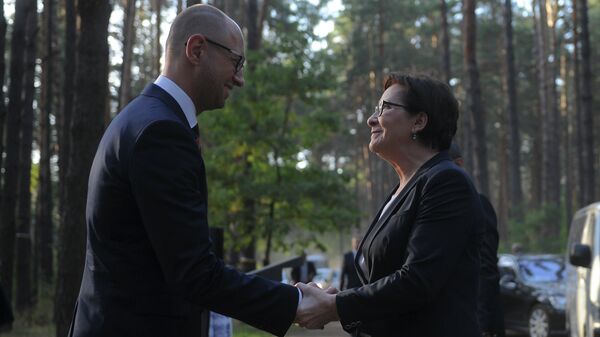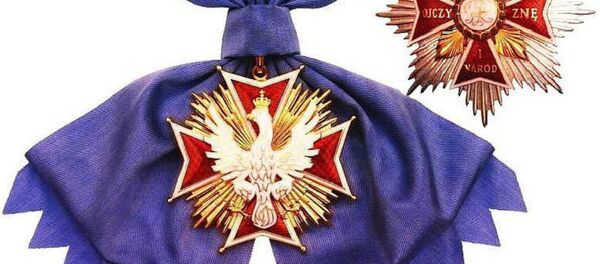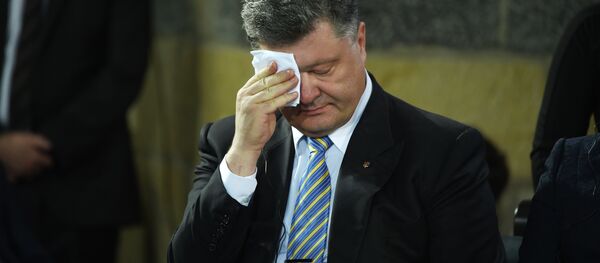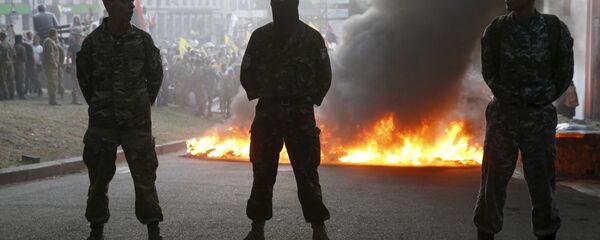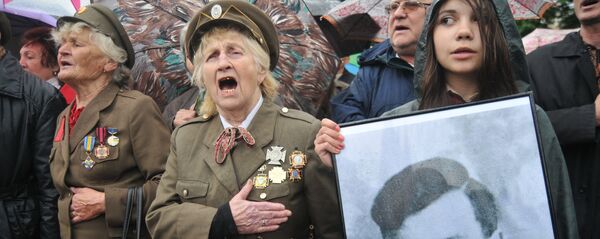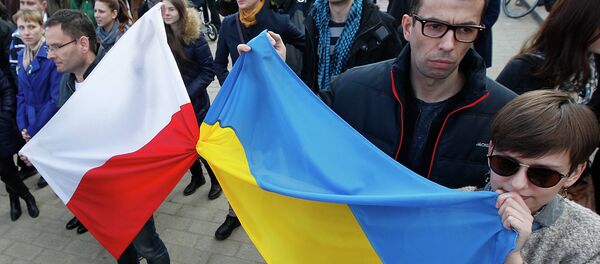The analysis, written by Ukrainian Institute of World Policy director Alena Getmanchuk, suggests that if before, authorities in post-Maidan Kiev could count on Polish support seemingly no matter they did, today, the situation is changing.
With Poland set to hold parliamentary elections this Sunday, Getmanchuk, the director of an institute whose publicly stated mission is to increase support for 'Ukraine's Euro-Atlantic aspirations', suggests that these days, Ukraine is becoming more and more unpopular in Poland, both among ordinary Poles and among the political elite.
Unfortunately for Kiev, Getmanchuk notes that "it cannot come as anything but a surprise that few people in Ukraine notice the disturbing trends which have become visible in Poland over the past year. Many still seem to think that support for Kiev is something akin to a life-long duty for Warsaw, no matter who is in power in either capital."
These 'disturbing trends', in the analyst's view, include Poles' growing disenchantment with and "irritation" over Ukrainian authorities' initiatives, particularly those glorifying Second World War era war criminals, many of whom were primarily engaged in the ethnic cleansing of western Ukraine's Polish population.
Getmanchuk suggests that her meetings "with politicians and diplomats in Warsaw demonstrates that the regression in the relationship between the two countries is obvious," and that the "sense of irritation over Ukraine" is growingly palpable.
Support for Ukraine Growing More and More Politically Unpopular
Getmanchuk notes that "in the course of these parliamentary elections, support for Ukraine is becoming an unfavorable position [to hold]. This became obvious back in May, when rock musician Paul Kukiz took third place in the country's presidential elections. He received 21% of the vote, despite his openly anti-Ukrainian rhetoric."
Picking at Historical Wounds
The analyst points out that "Poles are now very worried about the fact that, following the Revolution of Dignity [what supporters call the Maidan coup d'état] the issues surrounding the Ukrainian Insurgent Army, Stepan Bandera and the red and black flag are no longer considered only regional and marginal phenomena. As our Polish colleagues tell us, this is 'no longer just part of our dialogue with Galicia, but part of our dialogue with Ukraine.'"
Getmanchuk notes that a survey carried out by the Institute of World Policy has found that "the UPA is one of five key associations ordinary Poles make with Ukrainians." Moreover, importantly, the association appears to be stronger among supporters of the right-nationalist Law and Justice Party (PiS), which is expected by many analysts to win Sunday's elections, than it is among the current ruling Civic Platform party.
"In Ukraine, it is customary to assume that Law and Justice is the real pro-Ukrainian party, and many words of praise were written when PiS candidate Andrzej Duda was elected president. However, the fact is that today, PiS is no longer what it was in the days of the late Lech Kaczynski," the analyst laments.
The analyst also worryingly suggests that there are no longer enough people in PiS's political establishment willing to 'forgive' post-Maidan Kiev for its glorification of its 'national heroes' dark past, recalling a statement by a PiS official during the closed portion of a recent Ukraine-Polish forum. The official noted that "Ukrainians must understand that the revitalization of Bandera's image harms Ukraine's image in Poland no less than its problems of corruption."
Getmanchuk notes that in the upcoming elections, the PiS will "try not to lose a single vote, especially over Ukraine. As a result, they have been avoiding the Ukrainian topic like the plague. This is why Andrzej Duda has not been in a hurry to meet with Poroshenko, or, moreover, to meet with him in Poland."
Moreover, the analyst notes that "in Warsaw, our partners are saying that the current approach by Duda and the PiS is not tactical, but strategic. With one voice, our respected colleagues tell us that 'the time for unconditional assistance to Ukraine has passed'."
A Slap in the Face to the Polish President
"According to my sources," the analyst noted, "Komorowski had the opportunity to choose between two countries for his last trip abroad ahead of the election – Ukraine, or Britain, the latter known for its large Polish community. Komorowski bet on Ukraine, and received in Kiev not only a slap in the face, but humiliation. Serious Polish political analysts confirm that the visit to Ukraine cost him about 1.5% of the vote during elections. Therefore, while it cannot be said that Komorowski lost his bid for reelection due to Ukraine, we made sure to 'help him'."
Getmanchuk notes that it is now crucially important for Ukrainians to find out whether the signing of the law to coincide with the Polish president's visit was an accident or a deliberate provocation.
"The case with Komorowski showed that Poland should be careful in its relations with Ukraine, because it can turn out so that sincere support can result in a knife in the back. This is something Lech Kaczynski felt with Yushchenko when the latter issued his famous decree making Bandera a 'hero of Ukraine'. It was also felt by Bronislaw Komorowski."
Bandera Threatens Ukraine's 'European Future'
Getmanchuk suggests that post-Maidan Kiev's "conflicting visions of Ukraine's past" could drastically affect the country in its pursuit of its desired future. "The idea that a country which 'glorifies terrorist methods of struggle' has little right to be considered for membership in the EU or NATO may not yet be mainstream, but is something which is increasingly being discussed," she notes.
Getmanchuk's logic sheds light on the fundamental problem over the ideational foundations of Ukraine in the aftermath of Maidan. So heavily influenced by the western Ukrainian ideal that Bandera was a hero in the fight for Ukrainian independence, and dependent on the ultranationalist volunteers who supported this idea most fervently, Ukraine's post-Maidan elite now seems trapped in pursuing a course which is set to lose it even its closest friends, including Poland.
